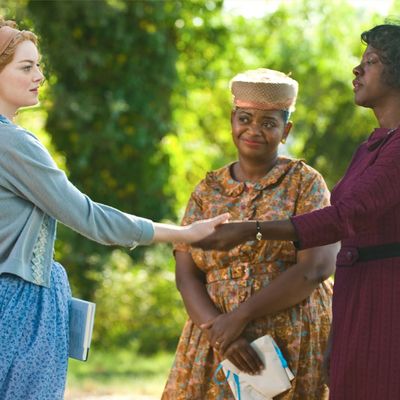
Written from three different perspectives, two of them African-American, Kathryn Stockett’s best-selling 2009 novel The Help is beloved for showing white people the world of domestic servitude through the eyes of black women and reviled, in some quarters, as a white author’s misappropriation of black women’s experience. My view of this controversy is easily stated: I have no idea who’s right. The novel, set in Jackson, Mississippi, in the early sixties, is predictable, heavy-handed, and rich in cringe-worthy Southern-Negra’ dialect. But it’s also rich in evocative detail, in close observation of servants and employers, and the distinctive coping mechanisms of each class. From a dramatic standpoint, the most compelling vantage might well be that of the young white woman, “Skeeter” Phelan, presumably Stockett’s alter ego. She’s wracked with guilt over having essentially been raised by a black woman too poor to stay home with her own children. If The Help exploits black experience, it does so partly out of a need for penance.
The film, faithfully adapted and directed by Stockett’s childhood friend, Tate Taylor (also an actor), has too glowing a palette and too many TV-style close-ups. But it’s an unusually thorough emotional workout: Get past one hurdle without blubbering and the next will bring you down. It plays like gangbusters on the level of soap opera — of what my family’s housekeeper used to call her “story,” which she watched avidly while ironing. Of course, if her “story” had featured black women paid poorly to iron white people’s clothes, all our lives might have turned out differently.
Emma Stone, an actress whose mind works so fast that she can be at once blurty and brainy, plays the 23-year-old Skeeter, an aspiring writer who returns from college to find her wealthy family’s cherished maid gone under mysterious circumstances, and her friends married with kids and black maids of their own. As racial tensions intensify (Medgar Evers is murdered, other blacks are lynched) and the snooty debutantes reveal their true segregationist selves, Skeeter prevails on her friend Elizabeth’s maid, Aibilene (Viola Davis), to tell her story in a book to be called, appropriately enough, The Help. It’s a potentially deadly enterprise in this time and place, even if the book will be credited to “anonymous,” with names and settings changed. And when Skeeter’s New York–Jewish editor (Mary Steenburgen) insists that there be many black women represented, the whole community of domestics must weigh the risks to themselves and their families.
Thank heaven for Hilly Holbrook (Bryce Dallas Howard), who’s just the kind of stock white Southern villainess who can drive even the most reticent of servants to pick up pen and paper. Howard slits her eyes and peers suspiciously at every vaguely human transaction between maid and employer: These people must always know their place! In her first scene, she announces that it’s unhygienic to let blacks use the toilets in white houses and directs her friends to build outhouses. Then Hilly dumps her aging mother’s maid, Minny (Octavia Spencer), for being what’s often called “sassy,” with trumped-up charges of theft thrown in for good measure. Finally, she refuses to loan Minny’s replacement a mere 75 dollars for the maid’s sons’ college tuition on the bizarre grounds that a good Christian has the strength of character to spurn offers of charity. Although white males were known to make sexual overtures to the help and white children to bedevil them, in The Help it’s only the women — the belles of the balls — who misuse their power and make life for their maids an endless series of insults.
The Help could have ended up a misogynist cartoon, but these actresses find every possible nuance — even Howard shows you the neurotic fear of losing control that holds Hilly’s racism in place. Jessica Chastain plays a handsome rich guy’s hot, uneducated wife who hires Minny on the sly to teach her how to clean and cook, and although the character has been simplified — in the novel, she’s scarily unstable — Chastain makes her helplessness hilarious. Sissy Spacek has some crowd-pleasing bits as Hilly’s mom, derisive toward her daughter even in her dottiness, while Allison Janney turns Skeeter’s often-oblivious mother into a study of obliviousness as it teeters on the brink of awareness. And while Octavia Spencer doesn’t rise above her “sassy” stereotype, she brings a good, theatrical charge to every scene.
But The Help belongs to Viola Davis. Some of Stockett’s critics have gone so far as to say she romanticizes domestic servitude by depicting black nannies’ genuine love for the white children in their care — as if Stockett were deluding herself into thinking she was more than just an unpleasant job for her family’s maid. But Davis makes Aibilene’s love for her employer’s neglected daughter overwhelmingly credible. She has eyes unlike other actress’s: hard, unyielding, with no give back. They only soften for this pudgy, needy little girl — and only then because they see in the child something frighteningly vulnerable that reminds her of her own child, and of all the children whose value goes unrecognized. It’s a tough, beautifully judged performance — it gives this too-soft movie a spine.


